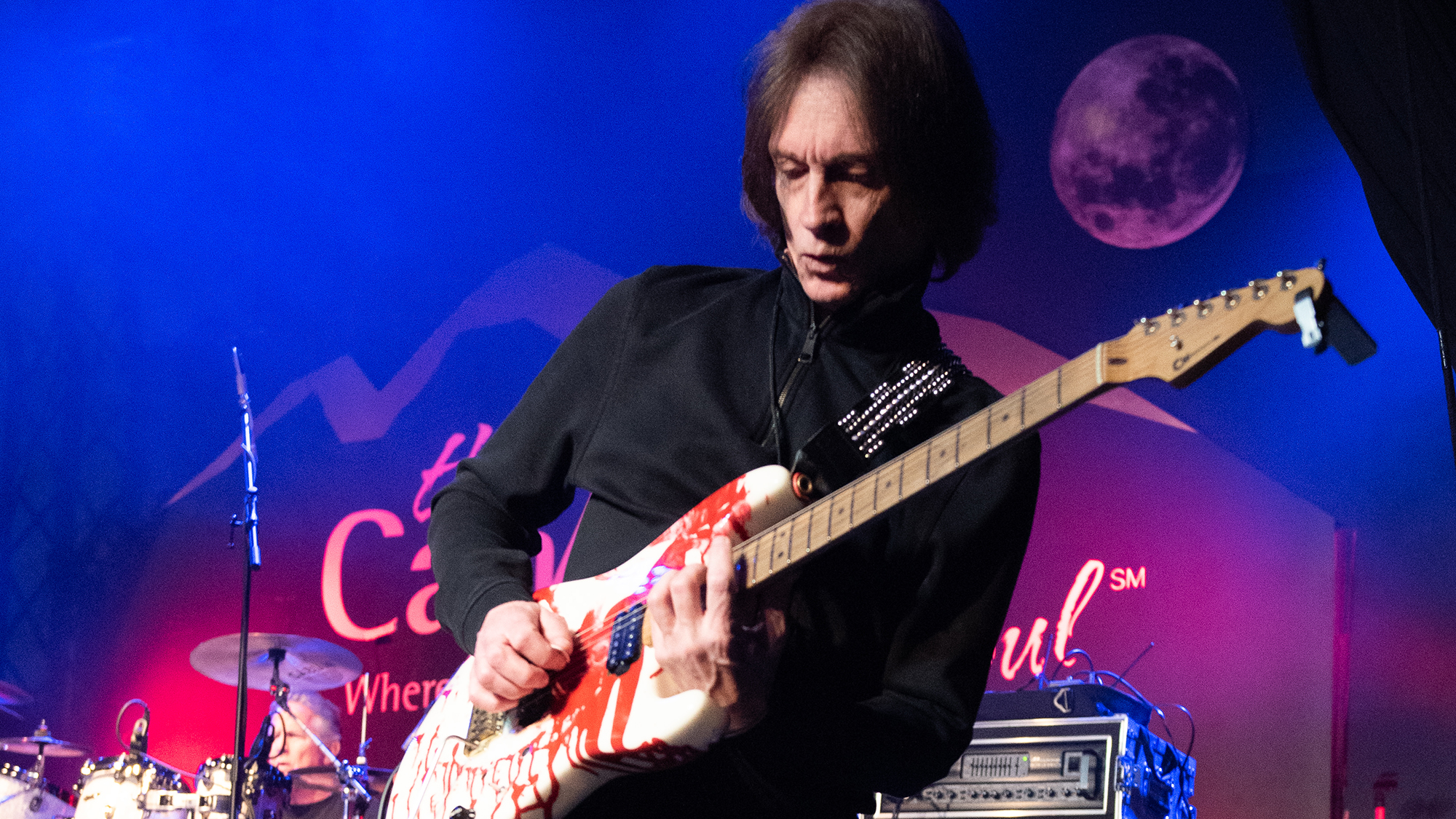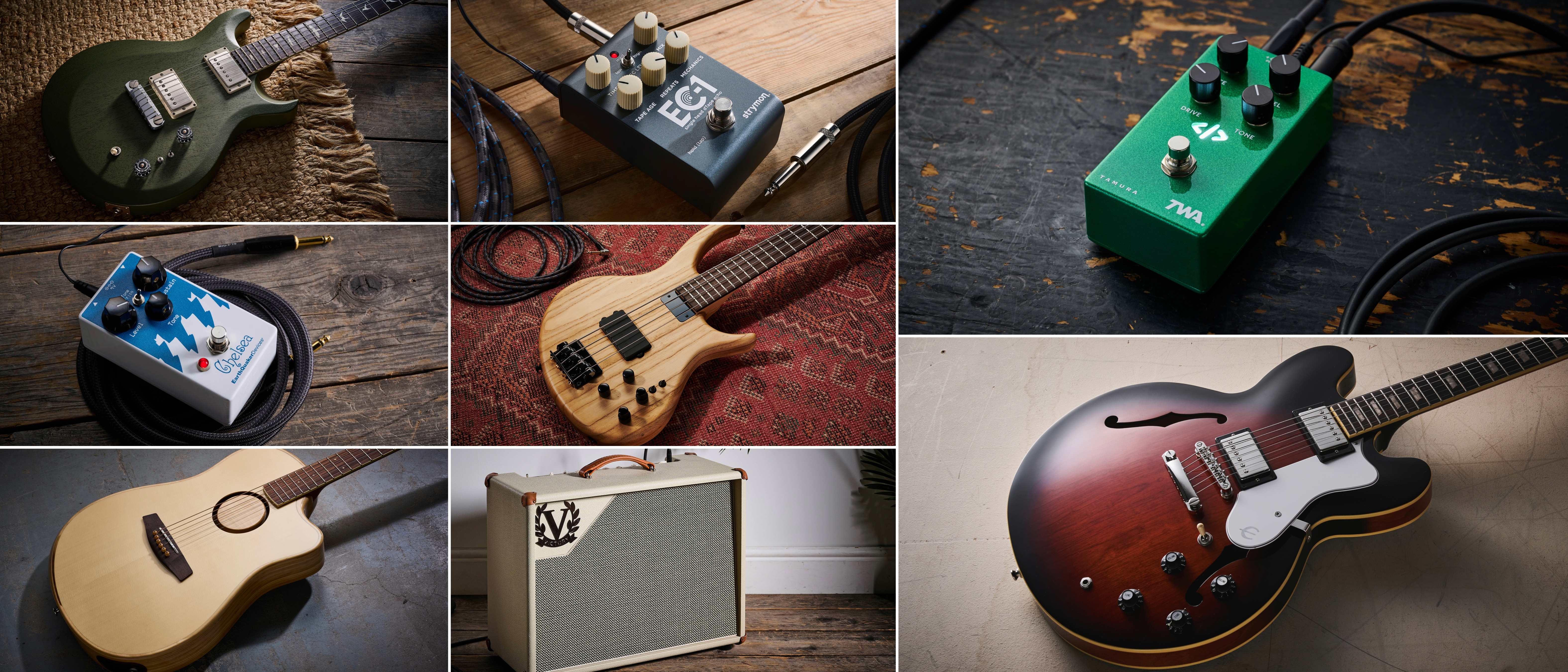"People said I was just jerking off on guitar. There was a point when I thought, ‘Oh, God, they’re right’”: Chris Impellitteri is one of the fastest guitarists of all time – but he realized there was more to life than shredding
Impellitteri explains why he listens to Albert King and Joe Bonamassa, what he learned from Eddie Van Halen and Ritchie Blackmore, and why he doesn’t regret missing out on the Ozzy Osbourne gig that went to Zakk Wylde

Chris Impellitteri is sometimes regarded as a guitar magician left behind by the shred era. “I was doing that before they coined the term ‘shred,’” he tells Guitar World. “When I heard it for the first time I was like, ‘Are you kidding me? You do that with a potato or cheese!
“I didn’t understand why they were calling it ‘shred.’ For me, being able to play fast can benefit the song when it’s heavy metal, because you’re trying to excite.”
Lack of excitement hasn’t been an issue for Impellitteri, but critics have often had a field day. “When we did our first EP I was playing really well, but I kind of fell apart emotionally and mentally when we did Stand in Line. I had a bad period; people would criticize me for playing too fast, calling it ‘guitar masturbation.’”
He reflects: “It was true; I agree with it 100 percent. But I was able to get back to where I started and get my technique back. That’s been a gift for our songs.”
Impellitteri’s latest record, War Machine, is filled with old-school metal closer to Judas Priest or Iron Maiden than the instrumental shred he's often compared to. “Looking back, I was a 22-year-old kid who had the world watching me,” he says. “Today you hear a mature musician.
“I understand how to apply music theory, what to do and what not to do. No matter what I play I always think, ‘My playing has to complement the song.’ The solo has to make that 30 seconds of the song better.”
Are there any unexpected places you go when you pick up the guitar?
All the latest guitar news, interviews, lessons, reviews, deals and more, direct to your inbox!
“What I do, I do out of love and enjoyment, and self-satisfaction first. So when I pick up the guitar I’m not challenged to say, ‘Oh, my God, I’ve got to work on a certain technique.’ or, ‘I’ve got to write a certain style of song.’ I just started playing. Whatever comes out of me is a very natural progression in my day.”
Many assume you spend most of your time shredding at high speeds – is that true?
“I play more lyrically when I first pick up the guitar. When you’re expressing yourself there’s an internal melody you’re hearing and trying to convey through the guitar. But I’m definitely playing fast often, just out of fun and challenging myself.”
Where do you go when you’re not playing fast?
“There’s a lot of my day where I play blues, which I love. I listen to Albert King and I love Joe Bonamassa. A lot of my day is spent playing really cool licks and trying to incorporate that into my style. I listen to classical music, so there are tidbits that I hear and emulate.”
Even though it’s given you notoriety, has fast playing been a curse?
“I can play very fast if I choose to. If you listen to this new record, War Machine, yes, there’s a lot of speedy passages – but there’s a lot of great melodies and great lyricism. Not everything is speed.
“One thing people have said I do really well, which I never really thought, is that when I play really fast it’s in a melodic sense that works for the song, even though I'm probably playing too many notes!
“The way I use speed is to excite or enhance the composition; I don't play fast for the sake of playing fast or to show off. I do it to lift the music.
“A good example is when we did the Stand in Line record in 1988; I had to really think about the guitar solo because, at first, I thought, ‘I’m playing too fast.’ But the engineer said, ‘No. Listen to it – it’s really melodic.’
“It created this really memorable phrasing, even though I was using a gazillion notes. I’ve always thought, ‘Is this going to be difficult for someone to hum?’ It needs to be memorable; something that, when you close your eyes, you can repeat in your head.”
I realized, ‘You’ve been given this gift; take it seriously.’ I went back to the drawing board and matured as an artist
What’s changed that’s allowed you to really lean into that?
“When I first came out, I had a lot of people following me because of my technique. I also had a lot of people following me because they liked the riffs I wrote – they liked the band.
“The things that stung was when people said I was just jerking off on guitar. There was a point in my life where I sat back, listened to the critics and thought, ‘Oh, God, they’re right.’ I’d lost my perspective.
“I was going through some pretty bad shit in my life, and unfortunately I went down the wrong road. Too many chemicals and whatever affected me and the way I played.
“As I got older I realized, ‘You’ve been given this gift, so take it seriously.’ I went back to the drawing board, took lessons, studied music theory, and matured as an artist.”
Is it true that you nearly joined Ozzy’s band at the height of your ‘80s fame?
“Let me not exaggerate that because it's been so many years. What I remember – and I don’t know if Jake E. Lee was still in the band – is that I was living in an apartment, and I had roommates.
“I came home one night from rehearsal, and my roommate goes, ‘Oh you've got to listen to this message,’ which said, ‘This is Sharon Osbourne. Me and Ozzy have been checking you out, and we really love your guitar playing. We want you to come down and audition.’

“I talked to Sharon, and I think Ozzy, probably three to five times.There was some back and forth. The problem was that I’d already signed a deal with Relativity Records.
“I had an attorney at the time named Peter Paterno, and he was frustrated and goes, ‘Chris, why didn't you do the gig?’ I was like, ‘It technically wasn’t offered to me. They basically just asked if I would come down and play with them.’”
When another player comes into my mind I go, ‘I wonder how Van Halen would have played this’
Did you actually audition?
“They were very interested, which was humbling. But at the same time, I’d just signed a deal. You can’t just walk out of a record deal; it’s not that simple. But I think I played two or three songs with them. I remember going down there and having fun – but that was it.”
It’s interesting to think about what Ozzy’s records would have sounded like had you signed on rather than Zakk Wylde.
“If you listen to the new record, War Machine, I promise you that a lot of the stuff we do has elements of Randy Rhoads. I can’t help it – he was a huge influence.
“If everything had worked out with Ozzy, I don't think I would have wanted to do a record in the direction that he went. And by the way, those records with Zakk are amazing; Zakk's a phenomenal player. I really love him.”
What direction would you have gone?
“I would have wanted to do something more like Blizzard of Ozz or Diary of a Madman. Zakk and those songs elevated Ozzy – imagine if you’d had this little brat kid like me, going, ‘No, no, no, we’re going to do another Diary of a Madman!’
“Would that have been a positive thing for Ozzy or a negative? That change was orchestrated as the landscape was changing. And Ozzy, who was already big, became even bigger.”
Would you say Randy was your biggest influence? You've often brought up Eddie Van Halen.
“I’m inspired by all guitar players; but a lot of times when another player comes into my mind, I don't know why, but I go, ‘Man, I wonder how Van Halen would have played this.’
“I do that with Uli Jon Roth, Michael Schenker, and even Paul Gilbert. I could name a million guys, but Randy Rhoads and Brian May come up a lot when I think about orchestration and pick attack.
How do you view gear today versus when you were younger?
“I’ve reverted back to the late ‘70s and early ‘80s stuff on the War Machine album. I’ve got a vintage Charvel from 1979 with no Floyd Rose, and it has a 12-inch radius and humbuckers. I’ve also got a 1975 Gibson Flying V, and I used my 1958 Gibson Les Paul.
People always compared me to instrumental guitar players… That was a huge mistake
“I’m still using a vintage Marshall, usually a modified vintage 100-watt Plexi. But on this record, I bought a bunch of vintage Mesa Boogies from 1984. I’m really reverting back to what was around when I was coming up.”
Is there a piece of gear that’s essential to your tone?
“Up until four or five years ago I never used pedals. I plugged my Strat right into my Marshall, which was modified for high gain. Usually, what I do is run the rig live dry, then make sure my wedges have some delay and reverb to give it ambiance. I get that great balance between wet and dry, which makes the guitar easy to play; it doesn’t fight you.”
What’s the biggest misconception about you as a guitar player?
“People always compare me to instrumental guitar players – whoever the flavor of the moment on YouTube is. In the old days it was Yngwie Malmsteen or the Shrapnel guys. That was a huge mistake; Impellitteri was never about me as a solo guitar player. It’s a band.
“For those who are stuck on just the guitar solos, there’s so much more to our music. I learned from Van Halen and Ritchie Blackmore that if you don’t have a good riff, you’re not gonna have an exciting tune.
“If you listen to Out of My Mind (Heavy Metal), it's resonated with fans around the world. You get the 20- or 30-second solo, but it complements the song.”
- War Machine is out now via Frontiers.
Andrew Daly is an iced-coffee-addicted, oddball Telecaster-playing, alfredo pasta-loving journalist from Long Island, NY, who, in addition to being a contributing writer for Guitar World, scribes for Bass Player, Guitar Player, Guitarist, and MusicRadar. Andrew has interviewed favorites like Ace Frehley, Johnny Marr, Vito Bratta, Bruce Kulick, Joe Perry, Brad Whitford, Tom Morello, Rich Robinson, and Paul Stanley, while his all-time favorite (rhythm player), Keith Richards, continues to elude him.
![Impellitteri - Stand In Line [HD] - YouTube](https://img.youtube.com/vi/ZGoEAPmht-g/maxresdefault.jpg)






